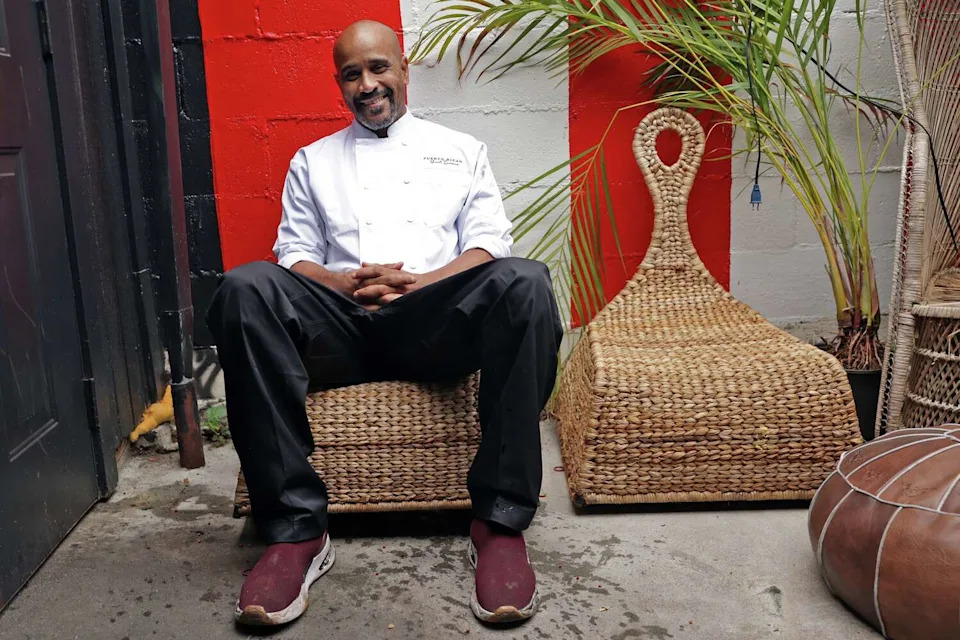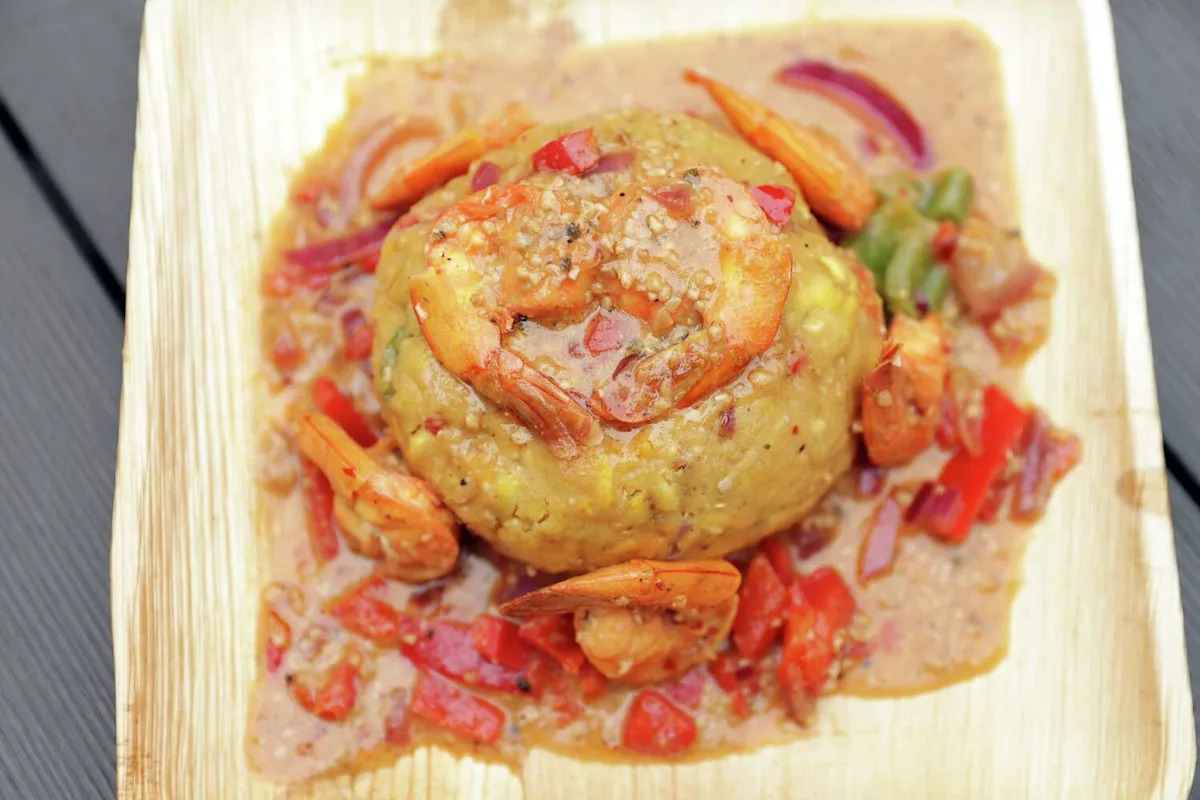On a recent visit to Puerto Rican Street Cuisine, I felt as if I had stumbled upon a small piece of the island in Oakland. Families seated on the sidewalk crunched on dark brown morsels of chicken chicharron. Bad Bunny’s baritone crooning spilled out of the restaurant’s window while Puerto Rico’s flag, planted on the roof of the building like a beacon for homesick Boricuas, billowed in the wind. I came for the canoa, something like a Boriquen hot dog: a fried plantain, sliced on the medial, loaded with peppery beef, melted cheese and lashed with aioli.
Opened this summer, Puerto Rican Street Cuisine marks the anticipated return of Eric Rivera, Oakland’s leading voice for Boricua cooking. Compared to many other metropolitan areas, the Bay Area’s Puerto Rican population is tiny, but the cuisine has a die-hard following, and its culture has been a topic of national discourse following the announcement of Bad Bunny headlining Super Bowl LX, which will take place at Santa Clara’s Levi Stadium next year.

Chef Eric Rivera sits in the outdoor patio at Puerto Rican Street Cuisine. (Scott Strazzante/S.F. Chronicle)
Rivera is best known for Borinquen Soul, a food-truck-turned-restaurant that operated in the back of Two Liquors Market until 2017. It was followed by W.E.P.A., which landed a spot on Guy Fieri’s “Diners, Drive-ins and Dives.” The latter closed after Rivera was arrested for a robbery charge and served a nearly six-year sentence; he maintains his innocence. The restaurants were something of a launching pad for the expansion of the Bay Area’s relatively small Puerto Rican food scene. Boriqua Kitchen and Casa Borinqueña were both founded by former Borinquen Soul workers, and Rivera hopes his latest restaurant inspires a new cohort.
The menu at Puerto Rican Street Cuisine might read like a compilation of Rivera’s greatest hits – combo plates, empanadas and canoas – but everything on it honors his late mother and grandmother. “I cook because of the women in my life,” he said. “I don’t have my grandmother or my mother with me anymore, but this is what brings me closest to them.”
The aforementioned canoa ($12) – the most popular dish – is imbued with personal significance. Rivera said that his grandmother showed affection with canoas, which she made as a shortcut version of pastelón, or, as he describes, “lasagna but with plantains.” His tweak: a zig-zag of Puerto Rican mayo-ketchup, a remoulade of sorts, punched up with sofrito, garlic – raw and granulated – and the key ingredient: raw onion. His canoa buzzes with sofrito and sazon, and is balanced by the caramelized sweetness of plantains and the tang of the condiment.

White rice, stewed beans and pumpkin with plantains and pork shoulder at Puerto Rican Street Cuisine in Oakland. (Scott Strazzante/S.F. Chronicle)
The most personal dish on the menu happens to be my favorite: an $8 side of fluffy white rice covered in habichela guisa (or guisadas): stewed pink beans interspersed with bits of squash. Habichuelas guisadas can’t be rushed. Like nearly every dish here, Rivera starts by frying sofrito, a building block of Puerto Rican cuisine. His is made with a puree of sweet aji peppers, a pantry’s worth of seasoning and regao, also known as culantro, which is like cilantro’s more pungent primo. To that, he adds tomato sauce, then the beans, which cook for the better part of an hour. Next, he layers in the squash chunks, letting them soften, before adding sliced red onions, the final ingredient.
Cooked to an ideal softness, the beans radiate with love and seasoning as the squash cubes practically disintegrate in your mouth. Each spoonful feels like putting on a puffer jacket on your soul.
The exceptional side dish accompanies combo plates ($17-19), which include a choice of meat such as melty, slow roasted pork (pernil) or pollo encebollado, as well as maduros and two beans with rice options – besides habichuelas guisadas, the other option is classic, homey arroz on gandules, or yellow rice with pigeon peas.

The decor at Puerto Rican Street Cuisine in Oakland. (Scott Strazzante/S.F. Chronicle)
Puerto Rican Street Cuisine is more than just a hit restaurant; it’s a community space, hosting cooking classes and watch parties of Bad Bunny’s concerts, as well as working with YEP Oakland, a youth empowerment group. When the government shutdown caused federal funding for SNAP benefits to run out in November, the restaurant announced free meals and discounts for kids under 12 years old.
Currently, the restaurant operates as a takeout window during the week, offering seating on the sidewalk. On weekends, it opens up the back patio, which is adorned with the Puerto Rican flag and plastic white chairs in front of faux shrubbery, a reference to the Bad Bunny album and love letter to the island, “Debi Tirar Mas Fotos.” Perhaps it’s an invitation to the superstar, in case he gets homesick after performing on America’s biggest stage.
Puerto Rican Street Cuisine. 1430 23rd Ave., Oakland. puertoricanstreetcuisine.com
This article originally published at The Bay Area’s best new Puerto Rican spot is fit for Bad Bunny.

